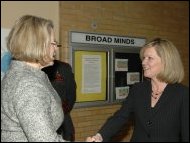 | |||||||||||
| |||||||||||
|
|||||||||||
Feinstein Elementary School Cooks Up Success
| ||||||||||||||||||||||||||
Principal Christine Riley of Feinstein Elementary School in Providence, R.I., has a recipe for student success:
- Use large measures of data-driven instruction, research-based teaching practices and uninterrupted time for reading;
- Combine ingredients with high-quality teaching; and
- Heat with high expectations until 100-percent student proficiency is achieved.
It's a surefire plan that has led to impressive gains at the school over the past several years. Students at Feinstein-where 1 in 4 speaks English as a second language-have made big gains in reading and math proficiency on the New England Common Assessment Program (the standardized exam adopted by Rhode Island, New Hampshire and Vermont). Between 2005 and 2007, the percentage of students proficient in reading jumped from 29 to 50 percent, and the school saw even bigger increases in mathematics proficiency, from 14 to 42 percent. "We have refined how we work as a school, so we really have a true professional learning community in which everybody's efforts are focused on student achievement," says Riley.
 Colleen Driscoll teaches a reading class for English language learners.  Second-grader Danny participates in the reading lesson.  Secretary Margaret Spellings meets Principal Christine Riley. |
That includes honing common planning time into a laser-like focus on data that revealed gaps in student performance on state, district and school assessments. Called "grade-level support meetings," these weekly sessions involve teachers, instruction coaches and the principal following a goal-oriented cyclical process. Moving through several stages, they begin by examining student work and test scores, then identify instructional strategies and interventions needed, and finally evaluate progress toward desired goals. The collaboration, says Riley, has provided an opportunity for continuous teacher learning. "The primary work of teachers in not just to teach but also to grow professionally."
Named after philanthropist Alan Shawn Feinstein, who is said to have established the first-ever public high school with community service as its theme, the school serves a largely Hispanic population, many of whom have emigrated from the Dominican Republic and Puerto Rico. Of the nearly 400 children enrolled, 90 percent qualify for subsidized meals, an indicator of the school's poverty level.
Also credited for change at Feinstein, which last year made the greatest achievement gains in the Providence Public School District, is a Reading First grant from the U.S. Department of Education, which provided funding for a full-time reading coach, materials, and training on scientifically proven methods of instruction. "It's not just something that someone threw on paper and decided that this is a fun activity to do," says teacher Colleen Driscoll, about the program's research-based strategies. "It has reasoning behind it. It has that rigor for the kids." Feinstein was part of the first cohort of schools in 2004 to receive the grant, which is designed to improve the literacy skills of disadvantaged students in grades K-3.
Parent Julie Mingoes was so impressed by how quickly and skillfully her son learned to read in kindergarten last year that she is now transferring her daughter to Feinstein to begin third grade there this fall. She says her son is always calling on her to read with him. "I'm just excited that he's excited. He can't wait to start first grade."
Unsubscribe
To unsubscribe from The Achiever:
- Send email to listserv@listserv.ed.gov
- Write in the body of the message: unsub nochildleftbehind
|
|
|
|||||||||||
| |
||||||||||||

